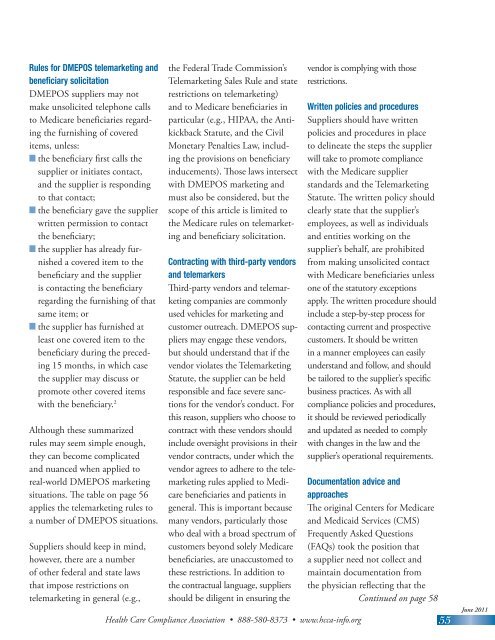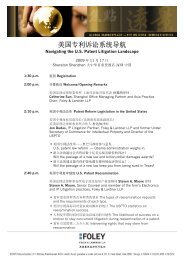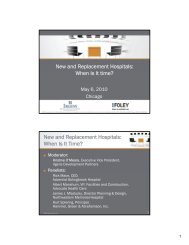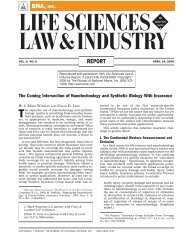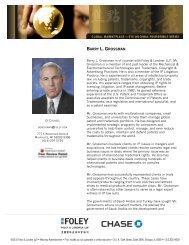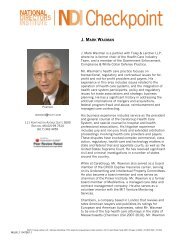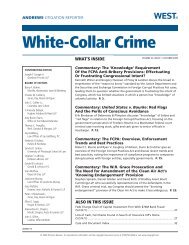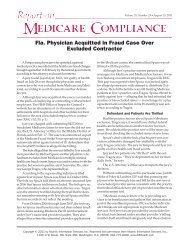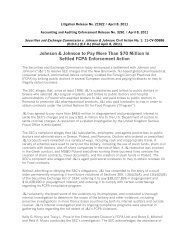Compliant DMEPOS Telemarketing - Foley & Lardner LLP
Compliant DMEPOS Telemarketing - Foley & Lardner LLP
Compliant DMEPOS Telemarketing - Foley & Lardner LLP
You also want an ePaper? Increase the reach of your titles
YUMPU automatically turns print PDFs into web optimized ePapers that Google loves.
Rules for <strong>DMEPOS</strong> telemarketing and<br />
beneficiary solicitation<br />
<strong>DMEPOS</strong> suppliers may not<br />
make unsolicited telephone calls<br />
to Medicare beneficiaries regarding<br />
the furnishing of covered<br />
items, unless:<br />
n the beneficiary first calls the<br />
supplier or initiates contact,<br />
and the supplier is responding<br />
to that contact;<br />
n the beneficiary gave the supplier<br />
written permission to contact<br />
the beneficiary;<br />
n the supplier has already furnished<br />
a covered item to the<br />
beneficiary and the supplier<br />
is contacting the beneficiary<br />
regarding the furnishing of that<br />
same item; or<br />
n the supplier has furnished at<br />
least one covered item to the<br />
beneficiary during the preceding<br />
15 months, in which case<br />
the supplier may discuss or<br />
promote other covered items<br />
with the beneficiary. 2<br />
Although these summarized<br />
rules may seem simple enough,<br />
they can become complicated<br />
and nuanced when applied to<br />
real-world <strong>DMEPOS</strong> marketing<br />
situations. The table on page 56<br />
applies the telemarketing rules to<br />
a number of <strong>DMEPOS</strong> situations.<br />
Suppliers should keep in mind,<br />
however, there are a number<br />
of other federal and state laws<br />
that impose restrictions on<br />
telemarketing in general (e.g.,<br />
the Federal Trade Commission’s<br />
<strong>Telemarketing</strong> Sales Rule and state<br />
restrictions on telemarketing)<br />
and to Medicare beneficiaries in<br />
particular (e.g., HIPAA, the Antikickback<br />
Statute, and the Civil<br />
Monetary Penalties Law, including<br />
the provisions on beneficiary<br />
inducements). Those laws intersect<br />
with <strong>DMEPOS</strong> marketing and<br />
must also be considered, but the<br />
scope of this article is limited to<br />
the Medicare rules on telemarketing<br />
and beneficiary solicitation.<br />
Contracting with third-party vendors<br />
and telemarkers<br />
Third-party vendors and telemarketing<br />
companies are commonly<br />
used vehicles for marketing and<br />
customer outreach. <strong>DMEPOS</strong> suppliers<br />
may engage these vendors,<br />
but should understand that if the<br />
vendor violates the <strong>Telemarketing</strong><br />
Statute, the supplier can be held<br />
responsible and face severe sanctions<br />
for the vendor’s conduct. For<br />
this reason, suppliers who choose to<br />
contract with these vendors should<br />
include oversight provisions in their<br />
vendor contracts, under which the<br />
vendor agrees to adhere to the telemarketing<br />
rules applied to Medicare<br />
beneficiaries and patients in<br />
general. This is important because<br />
many vendors, particularly those<br />
who deal with a broad spectrum of<br />
customers beyond solely Medicare<br />
beneficiaries, are unaccustomed to<br />
these restrictions. In addition to<br />
the contractual language, suppliers<br />
should be diligent in ensuring the<br />
vendor is complying with those<br />
restrictions.<br />
Health Care Compliance Association • 888-580-8373 • www.hcca-info.org<br />
Written policies and procedures<br />
Suppliers should have written<br />
policies and procedures in place<br />
to delineate the steps the supplier<br />
will take to promote compliance<br />
with the Medicare supplier<br />
standards and the <strong>Telemarketing</strong><br />
Statute. The written policy should<br />
clearly state that the supplier’s<br />
employees, as well as individuals<br />
and entities working on the<br />
supplier’s behalf, are prohibited<br />
from making unsolicited contact<br />
with Medicare beneficiaries unless<br />
one of the statutory exceptions<br />
apply. The written procedure should<br />
include a step-by-step process for<br />
contacting current and prospective<br />
customers. It should be written<br />
in a manner employees can easily<br />
understand and follow, and should<br />
be tailored to the supplier’s specific<br />
business practices. As with all<br />
compliance policies and procedures,<br />
it should be reviewed periodically<br />
and updated as needed to comply<br />
with changes in the law and the<br />
supplier’s operational requirements.<br />
Documentation advice and<br />
approaches<br />
The original Centers for Medicare<br />
and Medicaid Services (CMS)<br />
Frequently Asked Questions<br />
(FAQs) took the position that<br />
a supplier need not collect and<br />
maintain documentation from<br />
the physician reflecting that the<br />
Continued on page 58<br />
55<br />
June 2011


